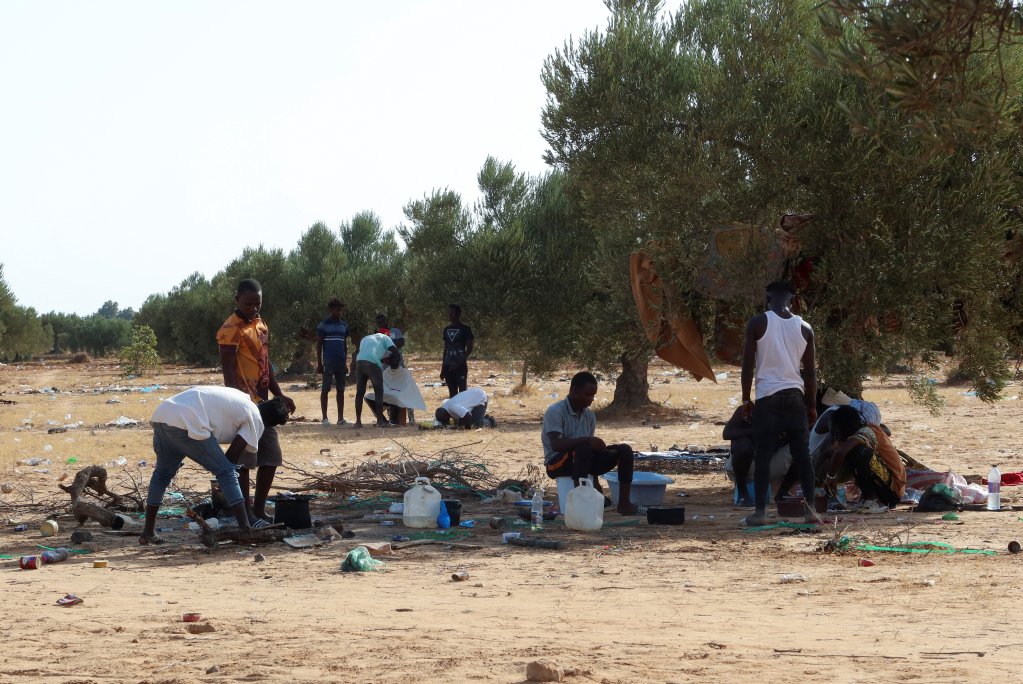The number of migrants in Tunisia who are opting to be sent back to their home countries has risen sharply in recent months, according to the IOM. The news comes amid continued hostility towards migrants in Tunisia, a major transit point to Europe.
More African migrants who made their way to Tunisia with the aim of setting off from there to Europe are choosing to return to their countries of origin, the UN migration agency IOM has said.
In the first six months of this year, three times as many people were assisted by IOM to return home as in the same period in 2023.
Under the agency’s Assisted Voluntary Return and Reintegration program (AVRR), migrants receive free flights home and support to rebuild their lives and reintegrate into their communities.
So far this year around 3,500 people have been helped to return from Tunisia to their country of origin under the AVRR, an IOM spokesperson told the news agency AFP on Wednesday (June 26). Most of the migrants came from Gambia, Burkina Faso and Guinea.
In 2023, a total of 2,557 migrants left Tunisia under the voluntary returns program.
The UN agency says it helps migrants to overcome challenges when they return to their countries of origin. Many returnees find it hard to rebuild their social and economic networks and report feelings of shame.
Also read: IOM helps 392 migrants return home from Tunisia
Go or stay?
But many clearly opt to go rather than stay in Tunisia. Conditions for migrants who remain in Tunisia – including those intercepted at sea by coast guard authorities – have become much worse in the past year.
Anti-Black racism and discrimination is on the rise throughout Tunisia, and Romdhane Ben Amor, a spokesperson for the Tunisian Forum for Economic and Social Rights (FTDES), says the country’s anti-migrant policy which sees the migrants as "a threat" is the reason more are opting to leave.
People are made precarious "by preventing them from working, renting apartments or using public transport," he told AFP.
Anti-migrant violence broke out last year after President Kais Saied gave a speech saying "hordes of illegal migrants" posed a demographic threat to Tunisia.
Hundreds of sub-Saharan Africans subsequently lost their jobs and homes.
Many migrants who have been forced out of the port city of Sfax and are living in makeshift camps have regularly reported being harassed and attacked by security services.
Human rights observers have confirmed that groups of migrants are being taken to remote locations in the desert and left there.
Also read: Tunisia: Accusations of clearances and expulsions

EU partnership
Ben Amor also believes that the rise in "voluntary" returns is a direct result of the European Union’s policy of countering irregular migration from Tunisia.
Last year the EU signed a "strategic partnership" with Tunisia, promising 105 million euros to the North African country in return for efforts to prevent migrant departures.
"The EU has given all the financial, logistical and technical means" to Tunisia to implement the policy, Ben Amor told AFP.
Some EU migration management funds have also helped to boost the efforts of Tunisia’s coast guard to intercept migrants at sea. Already this year, between January 1 and May 31, the coast guard has stopped at least 30,280 people from leaving the country by boat.
Currently, there are around 23,000 irregular migrants in Tunisia, according to figures from the interior ministry, who have few choices left to them: One is to sign up at the IOM office in Tunis in the hope of getting on the return program. Another is to attempt the Mediterranean crossing, which carries a high risk of death. According to FTDES, more than 1,300 people died or disappeared last year in shipwrecks off Tunisia’s coast.
With AFP
Also read: IOM distributes food to stranded migrants in Sfax, Tunisia
